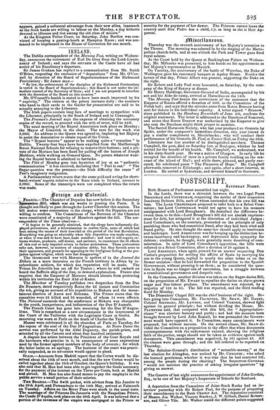.iiIistellantons.
Thursday was the seventh anniversary of her Majesty's accession to the Throne. The morning was ushered in by the ringing of the Metro- politan church-bells, and at one o'clock the Park and Tower guns fired royal salutes.
At the Court held by the Queen at Buckingham Palace on Wednes- day, Mr. Milbanke was presented, to kiss hands on his appointment as her Majesty's representative at Munich.
On Tuesday, the anniversary of the battle of Waterloo, the Duke of Wellington gave his customary banquet at Apsley House. Besides the heroes of that day, Prince Albert was present, supporting the Duke on the right.
Sir Robert and Lady Peel were honoured, on Saturday, by the com- pany of the King of Saxony at dinner.
Sir Henry Hardinge, Governor-General of India, accompanied by his son and his Aide-de-camp, arrived at Marseilles on the 14th.
The Morning Post denies the correctness of the statement that the Emperor of Russia offered a donation of 500/. to the Committee of the Polish ball ; and says that the mistake arose from Baron Brunow having sent for tickets in his individual capacity. A letter signed " Brunow," since published in the Hamburg Borsenhalle of June 4th, confirms the original statement. The letter is addressed to the Dutchess of Somerset, and states that Baron Brunow was authorized by the Emperor to give any sum the Dutchess might think proper to mention.
The Sacred Harmonic Society, who last year produced an Oratorio by Spohr, under the composer's immediate direction, this year intend to pay a similar compliment to, Mendelssohn ; who will conduct their performance of his Oratorio St. Paul, at Exeter Hall, on Friday the 28th. Literature has lost another of its distinguished members. Thomas Campbell, the poet, died on Saturday last, at Boulogne, whither he had retired for the benefit of his health. Mr. Campbell, we understand, was in his sixty-fourth year. He was a native of Glasgow. In early life he occupied the situation of tutor in a private family residing on the sea- coast of the island of Mull ; and while there, planned, and partly exe- cuted, his celebrated poem " The Pleasures of Hope." Mr. Campbell afterwards removed to Edinburgh ; and again, after a short interval, to London. He settled at Sydenham, and devoted himself to literature.


























 Previous page
Previous page